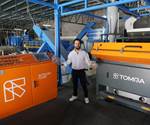New Tomra Study Finds Waste Management Contributes to Climate Protection
Holistic Resource Systems is the optimized combination of key waste management practices for collection, sorting and recycling to facilitate the transition toward a circular economy.
A new study commissioned by Tomra and conducted by London-based consultancy for sustainability Eunomia, demonstrates the potential for an optimized waste management system regarding climate change. Overall, a reduction of 2.76 billion tonnes of CO2/year is possible.
This reduction can be achieved using Holistic Resource Systems – the optimized combination of key waste management practices for collection, sorting and recycling.
Holistic Resource Systems are a combination of political framework regulations, such as extended producer responsibility, deposit return schemes, and technical processes for waste handling.
Eunomia has examined various models to identify the most efficient, cost-effective scenario for a holistic system.
The outcome for an efficient and cost-effective holistic system includes:
- Deposit return systems for PET bottles and metal beverage containers, which deliver a return rate of over 90%, should play a central role in such a system.
- As regard to remaining household waste, only biowaste, paper, textiles, and electrical and electronic equipment should be collected separately.
- The rest should remain in a mixed waste stream which can be most efficiently separated into reusable materials for further recycling.
This will enable regionally customized holistic models to cut global CO2 emissions by up to 5% - the equivalent of grounding all commercial flights globally and taking 65% of cars off the road.
“Now is the time for real action to ensure societies stop wasting resources with all the related negative consequences. In many places, the pandemic helped to meet Paris Climate Agreement goals,” said Volker Rehrmann, executive vice president and head of Tomra recycling/mining & circular economy division. “But even maintaining this level will require determined and consistent implementation, including holistic systems, to close the loops.”

Holistic Resource System model flow chart.
Related Content
-
Scaling Up Sustainable Solutions for Fiber Reinforced Composite Materials
Oak Ridge National Laboratory's Sustainable Manufacturing Technologies Group helps industrial partners tackle the sustainability challenges presented by fiber-reinforced composite materials.
-
PHA Compound Molded into “World’s First” Biodegradable Bottle Closures
Beyond Plastic and partners have created a certified biodegradable PHA compound that can be injection molded into 38-mm closures in a sub 6-second cycle from a multicavity hot runner tool.
-
How to Optimize Color Evaluation of Recycled Plastics
The right color measurement instrument and good working methods will minimize variability in color evaluation of PCR.






